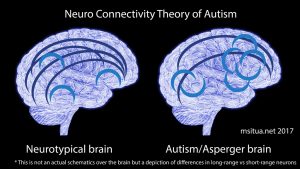We thought this a great basic overview (reference sheet) of Asperger Syndrome compiled by the staff at the Asperger/Autism Network. Nice to share if you or someone you know suspects autism.
About Asperger Syndrome:
- It is a neurological condition that affects the way information is processed in the brain.
- AS is a hidden disability. Many people appear very competent, but they have difficulties in the areas of communication and social interaction.
- AS has a genetic and hereditary component and may have additional interactive environmental causes, as yet unknown.
- AS is a developmental disability. All individuals have social/emotional delays, but continued growth seems to be life-long.
- The incidence of AS is thought to be 1 in 250. As many as 50% of people with AS may be undiagnosed.
- There are currently four males diagnosed with AS for every one female, but the true ratio may be as high as one female for every two males.

AS affects each person differently, although there is a core set of features that most people with AS have, to different extents, including:
- Having a very high intelligence and good verbal skills.
- Having challenges with the use and understanding of language in social contexts.
- Having trouble understanding what others are thinking and feeling (called Theory of Mind or perspective taking).
- Needing to be taught social behavior that is “picked up on” intuitively by others.
- Having difficulty understanding non-verbal cues such as hand movements, facial expressions, and tones of voice.
- Facing challenges with organization, initiation, prioritizing – considered executive functioning tasks.
- Focusing on small details rather than on the bigger picture
- Demonstrating intense interest areas such as movies, geography, history, math, physics, cars, horses, dogs or reptiles. These interest areas change every 3 months to several years
- Building friendships through mutual interest areas or activities.
- Viewing the world in black and white, with difficulty compromising or seeing gray areas.
- Feeling different, like aliens in our world.
- Sometimes experiencing anxiety and/or depression.
- Sometimes experiencing extreme and debilitating hyper- or hypo-sensitivity to light, noise, touch, taste, or smell. The environment can have a profound impact on their abilities to function.

Other elements and traits some individuals with AS have:
- Eye contact can be difficult, sometimes painful, and usually distracting (or if taught poorly, some individuals may stare).
- Some people with AS are clumsy, most have poor fine motor skills; although some excel in individual sports.
- Some individuals with AS have additional diagnoses, such as ADD, bi-polar, OCD.
- Some have superior skill in a particular areas such as painting, writing, math, music, history, electronics, or composing.
- People with AS may have difficulties working in groups.
- Children with AS may have meltdowns that last between 10 minutes and several hours, during which time the child is not in control of his/her behavior.
- Self-esteem can be an issue for individuals with AS, especially during middle school.
- Many are extremely good at memorizing facts and information.
- Some like to systemize the world as a way of understanding it.
A summary of some basic interventions that may be helpful for people with AS:
- Accepting the diagnosis and learning how it affects who you are
- Learning how and when to talk about it to others
- Providing support for adults in the area of budgeting and housekeeping
- Looking very carefully at social and physical environments to ensure that these spaces are tolerable for the person with AS
- Learning social and communication skills
- Learning social behavior
- Working with skills and interest areas
- Using of medications, with the guidance of a professional
- Setting up routines and preparing for transitions
- Minimizing transitions and social events with many unknown people
- Providing organizational supports (visual supports may be better for some people)
A graduate of Abilene Christian University, Jennifer had a long career in TV Broadcasting. Upon learning her oldest son Sam had a form of Autism called Asperger’s Syndrome, she left her career and became a full-time mother to both of her sons. Jennifer elicited the participation of her family and together they produced several independent programs including a children’s animated series titled Ameriquest Kids, as well as a documentary and book titled, Coping to Excelling: Solutions for School-age Children Diagnosed with High-Functioning Autism or Aspergers Syndrome. She formed the nonprofit Asperger101 to provide on-going free resources related to ASD at Aspergers101.com and has implemented the Texas Driving with Disability Program and continues to grow the statewide initiative today. She and her husband have recently retired to their property in the Texas Hill Country.



sensory challenges were mentioned but the side effects like limited food choices due to taste and feeling in the mouth and also they can have an aversion to showers and proper dental hygiene due to the sensory challenges.
This is a very good list. The only thing I would change is to use Asperger Autism as opposed to ASD since the concept of Aspergers as a disorder is from a medical, disease model without regard for neurotype difference.